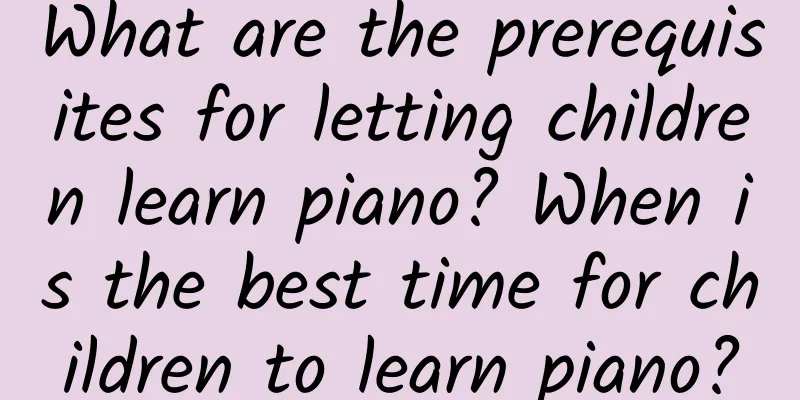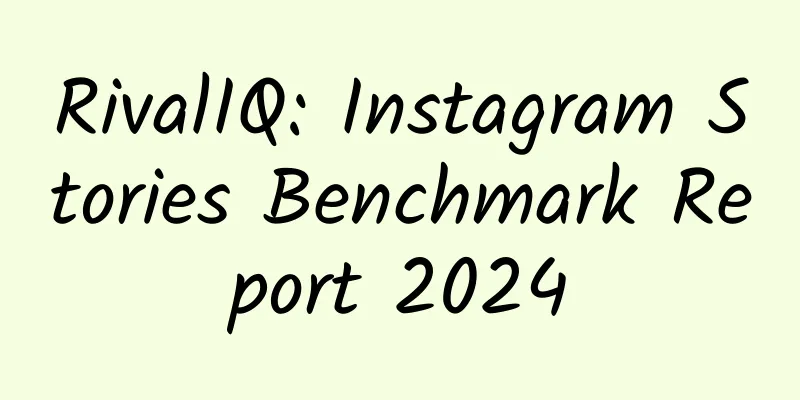What are the prerequisites for letting children learn piano? When is the best time for children to learn piano?

|
Learning piano requires exposure to and reading of a large number of excellent piano works. Through long-term training and the influence of works, children can not only be emotionally rich and cheerful, but also improve their musical appreciation. Nowadays, people's family conditions have improved, and many parents have decided to let their children learn to play the piano to cultivate their musical sense. Every parent hopes that their children will be better and have many talents. It should be noted that you must respect your child's ideas before making a choice. In this way, you can achieve twice the result with half the effort and reach or even exceed your psychological goals. Contents of this article 1. The benefits of children learning piano 2. Prerequisites for letting children learn piano 3. When is the best time for children to learn piano? 4. Things to note when learning piano for young children 1The benefits of learning piano for childrenImprove personal accomplishment and cultural quality Children who receive good music education from an early age can not only improve their musical literacy and artistic accomplishment, but also have important significance for cultivating a rigorous and practical learning attitude and the ability to study consciously and hard. At the same time, it also has a subtle influence on a person's cultural literacy, moral customs, sentiments, and character formation. Develop intelligence and cultivate coordination Piano practice and playing are a dynamic system that requires constant auditory focus, the active and sensitive movement of the ten fingers independently, and the coordination of the different movements of both hands with the whole body. It enables the left and right hemispheres of the brain to develop equally and enhance their mutual coordination. Numerous examples have proven that children who start learning piano at an early age are significantly better than ordinary children in terms of comprehension, acceptance, imagination and creative thinking after entering school. Develop an appreciation for music Learning the piano requires exposure to and reading a large number of excellent piano works. Through long-term training and the influence of the works, children can not only become emotionally rich and cheerful, but also improve their musical appreciation. Strengthening one's endurance and confidence Playing the piano requires relatively proficient techniques and skills, and requires regular, scientific, and long-term training. This training requires perseverance, endurance, confidence, and courage. Therefore, piano learning has a good effect on cultivating a strong will, a tenacious and enterprising quality, and a down-to-earth, rigorous, and scientific style. 2Prerequisites for children to learn pianoCan your baby maintain his concentration for more than 10 minutes? Can the baby control his small muscles freely? For example, can he hold a pen correctly? When the TV or radio plays nice music, does the baby have a sense of rhythm? Can he hum by himself after listening to it a few times? Does your baby show a tendency to like playing the piano? For example, he may imitate the postures of adults when playing, sing while playing, or often play a few notes on the piano by himself. Is your baby often curious about new things, especially music, and often asks questions to your parents? Do you and your family have time to practice piano with your baby? Can you practice piano with him at least 5 times a week? 3When is the best time for children to learn piano?The success of a great artist not only requires personal efforts and excellent personal conditions, but is also restricted by many factors such as family environment, social environment, and cultural environment. According to informal statistics, winners of major international competitions start learning piano at the age of 5-15, so the best age for children to learn piano is 5-10 years old. From the perspective of physiology and psychology, children aged 5 or 6 have good conditions in terms of brain development, attention, cognitive ability, and comprehension. In teaching practice, it is also found that older children have stronger receptive ability, higher self-awareness, and faster learning progress. They can even learn more in one year than children aged 3 or 4 years old. 4Things to note when learning piano for children1. Check your baby Innate conditions If the baby can hold the pen in the correct posture, it means that the small muscles of the child's hand can be controlled freely, which means that the most basic conditions for learning piano are met. As long as the child has ten healthy fingers, he can learn piano. The baby's sensitivity to music is also very important. For example, does he like to listen to music? When the TV or stereo plays good music, can he dance to the rhythm of the music unconsciously, and imitate and hum it after listening to it several times? How is his musical memory? Can he remember it clearly and accurately after listening? In addition, he should have a keen sense of hearing and have a fine ability to distinguish the slight differences in the height, length, and strength of the sound. 2. Weighing the Strengths One-time investment Before your baby learns to play the piano, parents should be mentally prepared for future expenses. The first is the cost of buying a piano. Generally, children choose upright pianos for piano learning, because upright pianos take up less space and are cheaper than grand pianos, making them more suitable for home learning. Parents can choose different pianos according to their own financial strength. A suitable piano is good, and a piano that costs 10,000 to 20,000 yuan is enough for beginners. 3. Look within yourself Sufficient patience and resilience The effectiveness and sustainability of a baby's piano learning depends largely on the patience and resilience of the parents. Only when the parents can persist can the child persist. Therefore, if you plan to let your baby learn piano, parents must be prepared for a "protracted war" and maintain a calm mind. 4. It is best to learn piano at least 5 years old Playing the piano requires "childhood skills", but this does not mean that babies aged 2 or 3 can "start lessons". Children who are too young have not yet fully developed their small muscles and body coordination, their bones and joints have not yet fully matured, and their attention is relatively weak. Practicing the piano too early may affect the growth and development of their hand bones, joints, and ligaments, and in severe cases may even cause bone deformities. However, these physical indicators of 5-year-old children are basically up to standard, their cognitive ability and self-control ability have been significantly improved, and they have a certain ability to distinguish and understand music. |
<<: How should a piano be maintained and cleaned? What should be used to clean piano oil stains?
>>: How to learn piano quickly? What is the best season to tune the piano?
Recommend
Pregnant woman acid reflux water is a boy or a girl
The most important feature of a woman giving birt...
What are the symptoms of Qi and blood deficiency and cold uterus?
Qi and blood deficiency and cold uterus are a ver...
[Medical Q&A] Can taking tonic medicine or diet therapy solve the problem of erectile dysfunction?
Author: Liu Kaifeng, deputy chief physician, Sube...
Will I get pregnant right after my period?
Many people know that safe period contraception i...
What causes heavy menstrual bleeding?
What causes heavy menstrual bleeding? Nowadays, m...
Color change chart of lochia after normal delivery
The discharge of lochia after giving birth is a n...
Eating breakfast like this can actually accelerate aging? A change in breakfast can reduce the risk of disease!
What time do you usually have breakfast every day...
JD.com: 63% of people have mobile phone storage anxiety, and 75.5% of users have 256GB or less mobile phone storage space
According to a recent survey conducted by JD Cons...
What happens when the embryo implants in the uterus?
Embryo implantation is a relatively new concept t...
How to set the camera resolution on Huawei Honor phones? Does it matter if Huawei Honor phones don't have a screen protector?
The screen of Huawei Honor is Corning Gorilla 3rd...
How should dysmenorrhea be treated?
Dysmenorrhea accompanies many women's menstru...
At this time, should I “eat before going to bed” or “go to bed hungry”?
If you are hungry before going to bed, should you...
Is there any way to make nipples smaller?
Every woman wants to have a pair of perfect breas...
What causes fever during menstruation?
Many women have problems of one kind or another d...
What to do with spring allergic rhinitis? Here are the solutions
Spring is here People go out to enjoy the flowers...









